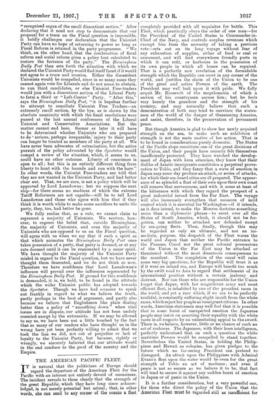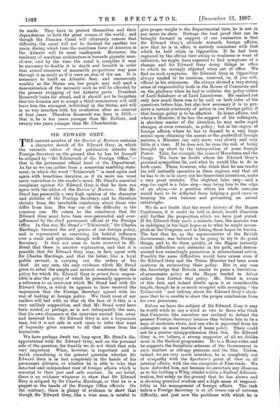THE AMERICAN PACIFIC FLEET.
TT is natural that the politicians of Europe should regard the departure of the American Fleet for the Pacific with an interest not entirely devoid of uneasiness. The incident reveals to them clearly that the strength of the great Republic, which they have long since acknow- ledged, is not merely potential but actual; that, in other words, she can send to any corner of the oceans a fleet completely provided with all requisites for battle. This Fleet, which practically obeys the order of one man—for the President of the United States is Commander-in- Chief of the Navy, and controls surplus revenues which exempt him from the necessity of taking a previous vote—sets out on its long voyage without fear of any exhaustion of supplies, either of food or coal or armament, and will find everywhere friendly ports in which it can refit, or harbours in the possession of its own people in which all losses can be repaired. That is a perfectly new revelation of the formidable strength which the Republic can exert in any corner of the world, and justifies the claim of the Union to be one of the great and active Powers of the earth. The President may well look upon it with pride. We fully acquit Mr. Roosevelt of the megalomania of which a section of his countrymen accuse him ; but he feels very keenly the grandeur and the strength of his country, and may naturally believe that such a demonstration of both may tend to convince the states- men of the world of the danger of threatening America, and assist, therefore, in the preservation of permanent peace.
But though America is glad to show her newly acquired strength on the sea, to make such an exhibition of strength is not the main motive of her action. That is to be found in considerations purely domestic. The States of the Pacific slope constitute one of the great divisions of the Union, and their people have recently felt themselves insufficiently protected. They have watched the develop- ment of Japan with keen attention, they know that their dislike of Asiatic immigrants constitutes a perpetual provo- cation to Tokio, and they fancy that a wave of emotion in Japan may some day produce an attack, or series of attacks, for which their sea-board cities are ill prepared. The appear- ance of so splendid a fleet of their own upon their own coast will remove that nervousness, and with it some at least of the bitterness with which they regard the prospect of a great industrial inroad from the Far East. The voyage will also immensely strengthen that measure of mild control which it is essential for Washington—if it intends, as it does intend, to make the Monroe doctrine something more than a diplomatic phrase—to exert over all the States of South America, which, it should not be. for- gotten, can neither be attacked nor defended except by sea-going fleets. Then, finally, though this may be regarded as only an ultimate, and not an im- mediate, purpose, the despatch of the Fleet warns the world and Japan that neither the Pacific entrance to the Panama Canal nor the great colonial possessions • of the Union in the Far East may be attacked or threatened without the most disastrous consequences to the assailant. The completion of the canal will raise some very big questions, for the Republic will treat it as if it were an inland sea, and Europe will benefit too much by the swift road to Asia to regard that settlement of its international position without a certain jealousy and distrust. Nor can those who are responsible for the Union forget that Japan, with her magnificent army and most efficient fleet, is inhabited by one of the proudest races in the world, and yet a race which, if wo are to be perfectly truthful, is constantly suffering slight insult from the white races, which reject her people as immigrant citizens. In other words, American statesmen may well feel that it is possible that in some burst of unexpected emotion the Japanese people may insist on asserting their equality with the white races in all respects by au unhesitating appeal to the sword. There is, we believe, however, little or no chance of such an act of rashness. The Japanese, with their keen intelligence, perfectly understand that on such a question the white maritime Powers would be compelled to stand together. Nevertheless the United States, in holding the Philip- pines and Hawaii as colonies, has given pledges to the future which no far-seeing President can pretend to disregard. An attack upon the Philippines with Admiral Evans's fleet upon the water would be even for the great strength of Tokio an act of madness ; and even if peace is not so secure as we believe it to be, that fact will tend to secure it against any sudden burst of emotion in Japan or of panic in the Union.
It is a. further consideration, but a very powerful one, for those who direct the policy of the Union that the American Fleet must he regarded still as insufficient for its needs. They have to protect themselves and their dependencies in both the great oceans of the world ; and though the Panama Canal will ultimately remove that difficulty, the canal will not be finished for another ten years, during which time the maritime force of America in the Atlantic will be most inadequate. Moreover, the tendency of maritime architecture is towards gigantic men- of-war, and by the time the canal is complete it may be necessary to double it in depth and breadth in order that armed steamers of mammoth proportions may pass through it as easily as if it were an arm of the sea. It is necessary to build an Atlantic fleet, and enormously wealthy-as the States are, her people may well need a demonstration of the necessity such as will be afforded by the present stripping of her Atlantic ports. President Roosevelt looks far ahead, and it should not be forgotten that his decision not to accept a third nomination will still leave him the strongest individual in the States, and will in no way interfere with his re-election after an interval of four years. Theodore Roosevelt was born in 1858,— that is, he is ten years younger than Mr. Balfour, and twenty-two years younger than Mr. Chamberlain.















































 Previous page
Previous page